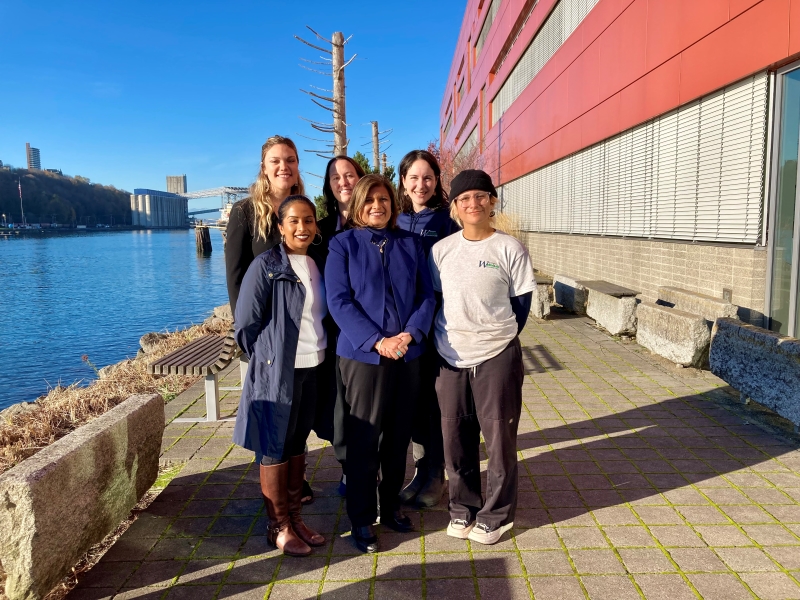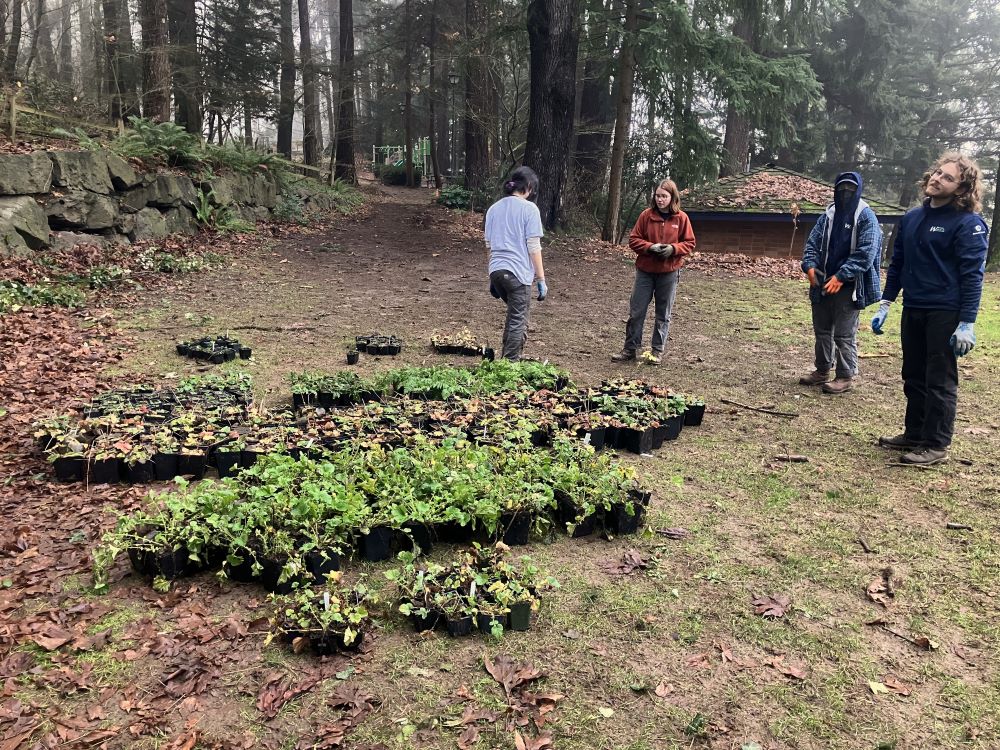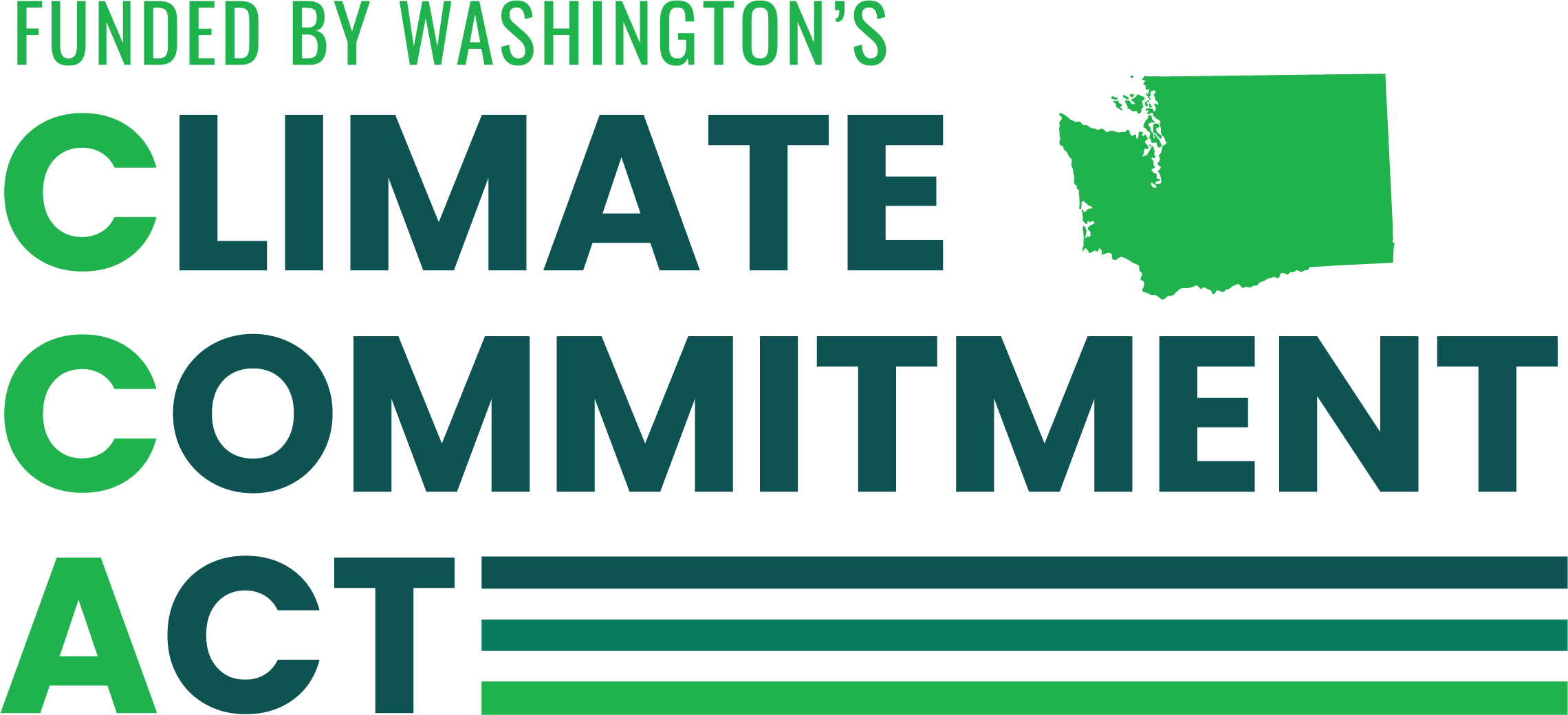This past fall, our Washington Conservation Corps (WCC) program joined the Washington Climate Corps Network (WCCN) as a grant recipient committed to building climate-resilient communities and ecosystems.
Formed during the 2023 legislative session, the WCCN is made up of organizations focused on building a clean-energy and climate-resilient future by amplifying service opportunities for young adults and veterans. The network provides funds to local programs addressing climate change while prioritizing service for and with overburdened communities facing disproportionate environmental harm.
During the network’s inaugural year, WCC joined EarthCorps, CivicSpark, and the Student Conservation Association as participating WCCN programs.
WCC Director Bridget Talebi (back middle) stands with state Rep. Vandana Slatter (front center), EarthCorps Director Evlyn Andrade (front left), WCC Admin Operations Manager Laura Schlabach (back right), and AmeriCorps members Tia Fidaleo (front right) and Jeriah Bankson (back left) at the launch of the Washington Climate Corps Network in Tacoma.
Celebrating a new milestone
In November 2023, WCC Director Bridget Talebi joined Gov. Jay Inslee, state Rep. Vandana Slatter, and staff from EarthCorps and Serve Washington to celebrate the launch of the WCCN.
The WCCN is made possible by Washington's Climate Commitment Act.
“Young adults today are seeking opportunities to make an impact. They want to improve the outlook for our state and our planet by helping to solve our climate conundrum,” Bridget said at the WCCN kickoff. “They are seeking out organizations that are forward-looking and actively offering solutions. The WCCN is their opportunity to get involved, build toward a better future, and gain transferable experience along the way.”
We have already put WCCN funds to use by increasing our member living allowances for our 2023-2024 service term, expanding opportunities for shared-identity spaces through our member affinity trips, and continuing our environmental justice program.
Growing environmental justice with WCCN
With the help of WCCN, WCC has supported more than a dozen partners through our environmental justice program during our 2023-2024 service term. These partners — including nonprofit organizations and local and Tribal governments — receive WCC field crew support at no cost for restoration and trail projects that advance environmental justice goals.
Below are two of the environmental justice projects our crews have supported so far this service term.
Restoring historic Tukwila Park
In King County, our WCC crew joined the city of Tukwila and Green Tukwila Partnership for a month-long restoration project at Tukwila Park. The city’s oldest park was established in 1934 and serves as a key neighborhood green space that includes a nearby elementary school, low-income housing, condos, apartments, family housing, and an adjacent bus line.
Unlike much of the land surrounding the Duwamish River, Tukwila Park evaded logging in the early 1900s and remains home to a patch of mature fir forest. The park provides necessary stormwater filtration and noise buffers for the community north of U.S. Interstate 405, but warmer temperatures and invasive English ivy have threatened the health of the forest by choking out sunlight and limiting secondary growth.
WCC members sort native potted plants in a field at Tukwila Park. The plants were transplanted into an area once covered in English ivy.
Throughout December, our crew coordinated with Tukwila to remove English ivy in roughly 2.5 acres of the 6.5-acre park. Once areas were cleared of invasive plants, the crew immediately installed and mulched more than 500 native plants in their place.
“Without WCC's environmental justice program, we would not be receiving these weeks of much-needed service,” said Olena Perry, Tukwila events and volunteer specialist. “Having a crew come in to focus on invasive removal and planting is amazing — just incredible. I am blown away by what WCC has completed — they are so much fun to work with.”
Instead of flourishing ivy, the area is now a diverse mix of native fringecups, grand firs, western hemlocks, vine maples, snowberries, wood ferns, and a variety of small flowering plants. In March, the crew will return to dedicate another four weeks of service to further restore the health of the historic forest.
Reforesting with Whatcom Million Trees
In Whatcom County, our crews have been serving with Whatcom Million Trees to restore a forest at Nugent’s Corner River Access, a county recreational area bordering the Nooksack River and State Route 520. Whatcom Million Trees has a long-term goal of reforesting a 5-acre grass field within the park overtaken by invasive species. By bringing back forest land, the park can provide better flood resilience, cleaner air, and shade for visitors while expanding habitat for native species and sequestering additional carbon.
Our crew kick-started the invasive removal phase of the project this fall by removing nearly 25,000 square feet of invasive Himalayan blackberry — cutting back the shoots and roots to dissuade regrowth. With the area cleared, Whatcom Million Trees will begin the next phase of reforestation by hosting volunteer planting days this spring to transplant nearly 3,000 new trees at the site.
Join WCC
WCC recruits nearly 300 AmeriCorps members annually to join our program and support restoration projects around the state! WCC is open to young adults (ages 18-25) and military veterans of any age who want to improve their local environment and grow their careers through hands-on experience and training.
Applications for our upcoming summer term (running June 10 through Sept. 5, 2024) are set to open in April. Learn more about our positions and join our mailing list to be notified when our next application period opens!


